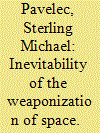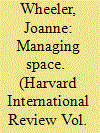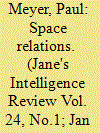| Srl | Item |
| 1 |
ID:
111628


|
|
|
|
|
| Publication |
2012.
|
| Summary/Abstract |
The concept of national security is based on the need to maintain the safety and security of the population. In 1957, the Soviet Union was the first state to threaten this safety in space with the launch of Sputnik. Although Sputnik did not pose a credible threat, it was perceived as such by the Western world. As the space race intensified in the 1960s, efforts were made to prevent the development and use of space weapons. With the 1967 Outer Space Treaty, space weapons were effectively made unlawful, with signatories agreeing to forgo these expensive technologies. However, at the beginning of the twenty-first century, factors and efforts are beginning to converge that indicate the inevitability of space weaponization. Based on a new concept of technological development, this article proposes that as technology advances, space weaponization not only is likely, but indeed is inevitable in the near future. Grounded in the competing theories of technological determinism and social constructivism, I offer a new theory that incorporates both and introduces new components to analyze a near-future technological timeline for space weapons. I argue that the development of these weapons is inevitable and should therefore be accelerated in the United States, given the country's position as the lone superpower, to command and control the space commons. If the United States leads this drive for development, then in the end, as with thermonuclear weapons, space weapons will make the world more, not less, secure, and will contribute to the spread of democratic peace and globalized capitalism.
|
|
|
|
|
|
|
|
|
|
|
|
|
|
|
|
| 2 |
ID:
119887


|
|
|
|
|
| Publication |
2011.
|
| Summary/Abstract |
In 1964, Arthur C. Clarke perceptively noted that "one day, we may have brain surgeons in Edinburgh operating on patients in New Zealand. When that time comes, the whole world would've shrunk to a point and the traditional role of the city as a meeting place for men would've ceased to make any sense. In fact, men will no longer commute-they will communicate." Clarke's comment predicts rather accurately some of the achievements in man's outer space activities since the Sputnik launch in 1957 and the signature of the Outer Space Treaty in 1967.
|
|
|
|
|
|
|
|
|
|
|
|
|
|
|
|
| 3 |
ID:
115851


|
|
|
| 4 |
ID:
109839


|
|
|